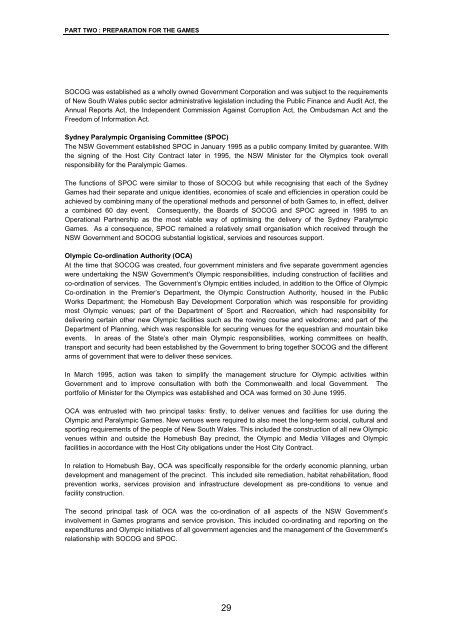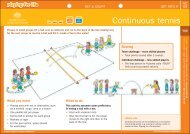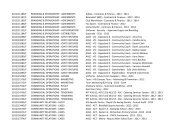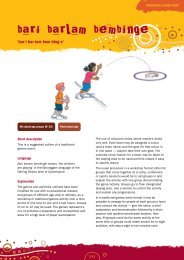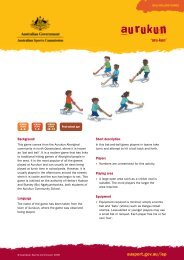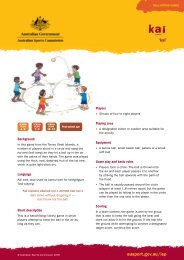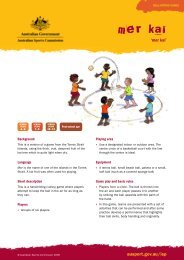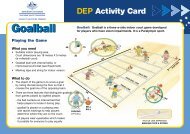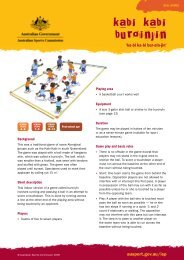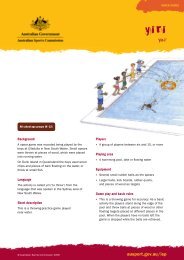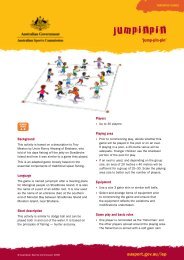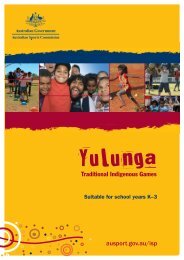the sydney 2000 olympic and paralympic games - Australian Sports ...
the sydney 2000 olympic and paralympic games - Australian Sports ...
the sydney 2000 olympic and paralympic games - Australian Sports ...
Create successful ePaper yourself
Turn your PDF publications into a flip-book with our unique Google optimized e-Paper software.
PART TWO : PREPARATION FOR THE GAMES<br />
SOCOG was established as a wholly owned Government Corporation <strong>and</strong> was subject to <strong>the</strong> requirements<br />
of New South Wales public sector administrative legislation including <strong>the</strong> Public Finance <strong>and</strong> Audit Act, <strong>the</strong><br />
Annual Reports Act, <strong>the</strong> Independent Commission Against Corruption Act, <strong>the</strong> Ombudsman Act <strong>and</strong> <strong>the</strong><br />
Freedom of Information Act.<br />
Sydney Paralympic Organising Committee (SPOC)<br />
The NSW Government established SPOC in January 1995 as a public company limited by guarantee. With<br />
<strong>the</strong> signing of <strong>the</strong> Host City Contract later in 1995, <strong>the</strong> NSW Minister for <strong>the</strong> Olympics took overall<br />
responsibility for <strong>the</strong> Paralympic Games.<br />
The functions of SPOC were similar to those of SOCOG but while recognising that each of <strong>the</strong> Sydney<br />
Games had <strong>the</strong>ir separate <strong>and</strong> unique identities, economies of scale <strong>and</strong> efficiencies in operation could be<br />
achieved by combining many of <strong>the</strong> operational methods <strong>and</strong> personnel of both Games to, in effect, deliver<br />
a combined 60 day event. Consequently, <strong>the</strong> Boards of SOCOG <strong>and</strong> SPOC agreed in 1995 to an<br />
Operational Partnership as <strong>the</strong> most viable way of optimising <strong>the</strong> delivery of <strong>the</strong> Sydney Paralympic<br />
Games. As a consequence, SPOC remained a relatively small organisation which received through <strong>the</strong><br />
NSW Government <strong>and</strong> SOCOG substantial logistical, services <strong>and</strong> resources support.<br />
Olympic Co-ordination Authority (OCA)<br />
At <strong>the</strong> time that SOCOG was created, four government ministers <strong>and</strong> five separate government agencies<br />
were undertaking <strong>the</strong> NSW Government's Olympic responsibilities, including construction of facilities <strong>and</strong><br />
co-ordination of services. The Government’s Olympic entities included, in addition to <strong>the</strong> Office of Olympic<br />
Co-ordination in <strong>the</strong> Premier’s Department, <strong>the</strong> Olympic Construction Authority, housed in <strong>the</strong> Public<br />
Works Department; <strong>the</strong> Homebush Bay Development Corporation which was responsible for providing<br />
most Olympic venues; part of <strong>the</strong> Department of Sport <strong>and</strong> Recreation, which had responsibility for<br />
delivering certain o<strong>the</strong>r new Olympic facilities such as <strong>the</strong> rowing course <strong>and</strong> velodrome; <strong>and</strong> part of <strong>the</strong><br />
Department of Planning, which was responsible for securing venues for <strong>the</strong> equestrian <strong>and</strong> mountain bike<br />
events. In areas of <strong>the</strong> State’s o<strong>the</strong>r main Olympic responsibilities, working committees on health,<br />
transport <strong>and</strong> security had been established by <strong>the</strong> Government to bring toge<strong>the</strong>r SOCOG <strong>and</strong> <strong>the</strong> different<br />
arms of government that were to deliver <strong>the</strong>se services.<br />
In March 1995, action was taken to simplify <strong>the</strong> management structure for Olympic activities within<br />
Government <strong>and</strong> to improve consultation with both <strong>the</strong> Commonwealth <strong>and</strong> local Government. The<br />
portfolio of Minister for <strong>the</strong> Olympics was established <strong>and</strong> OCA was formed on 30 June 1995.<br />
OCA was entrusted with two principal tasks: firstly, to deliver venues <strong>and</strong> facilities for use during <strong>the</strong><br />
Olympic <strong>and</strong> Paralympic Games. New venues were required to also meet <strong>the</strong> long-term social, cultural <strong>and</strong><br />
sporting requirements of <strong>the</strong> people of New South Wales. This included <strong>the</strong> construction of all new Olympic<br />
venues within <strong>and</strong> outside <strong>the</strong> Homebush Bay precinct, <strong>the</strong> Olympic <strong>and</strong> Media Villages <strong>and</strong> Olympic<br />
facilities in accordance with <strong>the</strong> Host City obligations under <strong>the</strong> Host City Contract.<br />
In relation to Homebush Bay, OCA was specifically responsible for <strong>the</strong> orderly economic planning, urban<br />
development <strong>and</strong> management of <strong>the</strong> precinct. This included site remediation, habitat rehabilitation, flood<br />
prevention works, services provision <strong>and</strong> infrastructure development as pre-conditions to venue <strong>and</strong><br />
facility construction.<br />
The second principal task of OCA was <strong>the</strong> co-ordination of all aspects of <strong>the</strong> NSW Government’s<br />
involvement in Games programs <strong>and</strong> service provision. This included co-ordinating <strong>and</strong> reporting on <strong>the</strong><br />
expenditures <strong>and</strong> Olympic initiatives of all government agencies <strong>and</strong> <strong>the</strong> management of <strong>the</strong> Government’s<br />
relationship with SOCOG <strong>and</strong> SPOC.<br />
29


